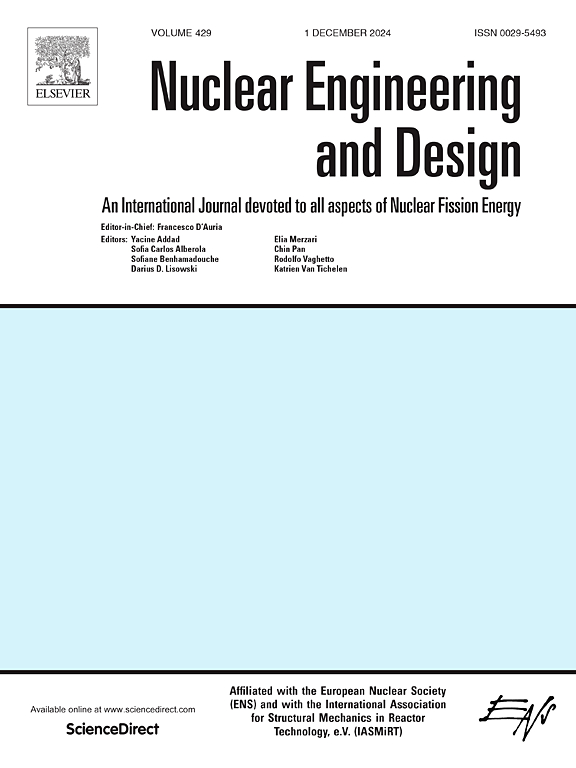研究和分析动载荷对反应堆冷却剂系统一次管道应用 LBB 技术的影响
IF 1.9
3区 工程技术
Q1 NUCLEAR SCIENCE & TECHNOLOGY
引用次数: 0
摘要
反应堆可能会受到动态载荷的影响,为了确保在反应堆冷却剂系统一次管道上安全可靠地应用 "先漏后破"(LBB)技术,对应用于一次管道的 "先漏后破 "技术进行了动态载荷冲击分析。对一次管道进行了动态力学性能试验,并对带有圆周贯穿裂纹的一次管道试件进行了动载荷下的裂纹泄漏率试验和不同加载速度下的冲击载荷加载试验。根据试验数据,采用准静态 LBB 技术中的裂纹泄漏率分析方法和裂纹稳定性分析方法,分析了在动载荷下应用 LBB 技术对主管道的影响。分析结果表明,将 LBB 技术应用于反应堆冷却剂系统一次管道时,动载荷下的分析结果比准静载荷下的分析结果更为保守,在实际工程应用中,动载荷下的分析结果更为安全可靠。本文章由计算机程序翻译,如有差异,请以英文原文为准。
Study and analysis of the effect of dynamic load on the application of LBB technology to the primary pipe of reactor coolant system
Reactors may be subjected to dynamic loads, and in order to ensure that Leak-Before-Break (LBB) technology is safely and reliably applied to the primary piping of reactor coolant system, dynamic load impact analysis of LBB technology applied to the primary piping was performed. The dynamic mechanical properties test was carried out on the primary piping, and the crack leakage rate test under dynamic load and the impact load loading test under different loading speeds were carried out on the primary piping test piece with circumferential penetrating crack. Based on experimental data, the crack leakage rate analysis method and crack stability analysis method in quasi-static LBB technology were used to analyze the impact of applying LBB technology to the primary piping under dynamic load. The analysis results indicate that, when LBB technology is applied to the primary piping of reactor coolant system, the analysis results under dynamic load are more conservative than those under quasi-static load, and it is safer and more reliable under dynamic loads in practical engineering applications.
求助全文
通过发布文献求助,成功后即可免费获取论文全文。
去求助
来源期刊

Nuclear Engineering and Design
工程技术-核科学技术
CiteScore
3.40
自引率
11.80%
发文量
377
审稿时长
5 months
期刊介绍:
Nuclear Engineering and Design covers the wide range of disciplines involved in the engineering, design, safety and construction of nuclear fission reactors. The Editors welcome papers both on applied and innovative aspects and developments in nuclear science and technology.
Fundamentals of Reactor Design include:
• Thermal-Hydraulics and Core Physics
• Safety Analysis, Risk Assessment (PSA)
• Structural and Mechanical Engineering
• Materials Science
• Fuel Behavior and Design
• Structural Plant Design
• Engineering of Reactor Components
• Experiments
Aspects beyond fundamentals of Reactor Design covered:
• Accident Mitigation Measures
• Reactor Control Systems
• Licensing Issues
• Safeguard Engineering
• Economy of Plants
• Reprocessing / Waste Disposal
• Applications of Nuclear Energy
• Maintenance
• Decommissioning
Papers on new reactor ideas and developments (Generation IV reactors) such as inherently safe modular HTRs, High Performance LWRs/HWRs and LMFBs/GFR will be considered; Actinide Burners, Accelerator Driven Systems, Energy Amplifiers and other special designs of power and research reactors and their applications are also encouraged.
 求助内容:
求助内容: 应助结果提醒方式:
应助结果提醒方式:


